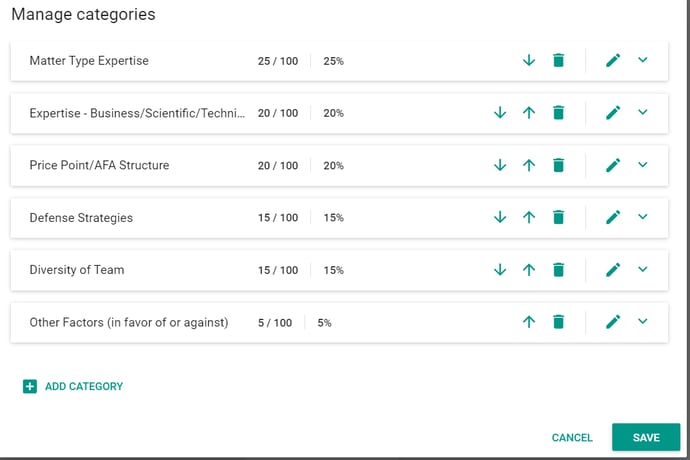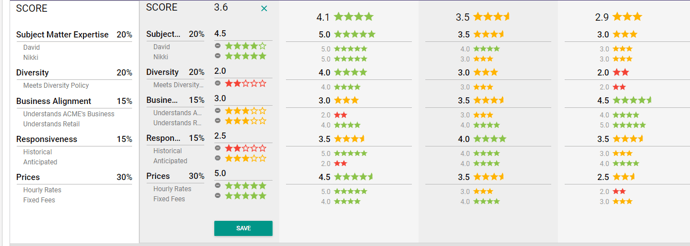
Scorecards for Legal RFPs: The Need, The Advantage, The Method
The Status Quo
How do corporations actually select outside counsel? As all good lawyers know, it depends. Based on several studies and interviews with corporations in both the US and the UK, common reasons outside counsel are selected include: price, client rapport, recommendations, panels, volume commitments, and first-choice firms being conflicted out (1).
These common reasons are certainly valid and reasonable metrics; but sometimes, these factors are not enough. For example, a low price tag on legal services is no consolation if your corporation loses a high-profile or multi-million dollar case. Or, it might come as a shock when you receive a multi-million dollar invoice for basic or routine legal services. Price is important, but it’s not the bottom line (pardon the pun).
Creating a scalable method by which to evaluate firms is possible, and necessary. Whether you want to standardize outside counsel selection across departments, increase diversity among outside counsel, or avoid hiring someone’s ‘buddy from law school,’ having a method in place is crucial. PERSUIT provides this method on a centralized platform for easy access and execution.
PERSUIT templatizes the firm selection process so you’re collecting uniform information from each firm invited to participate; the uniform RFP responses can then be evaluated on a standard “scorecard.” The scorecard is a consistent framework to evaluate firms that will bring a measure of objectivity to your selections. Additionally, using a scorecard helps eliminate potential biases in selecting firms that might not be right for your matter.
Using the Scorecard.
Selecting the right outside counsel means finding the firm that will help you reach your goals and objectives. (The following recommendations may be modified to accommodate many decision-making frameworks, but are best employed as a weighted factor analysis.)
Step 1 - For most focused results, choose approximately 3-6 key characteristics (“categories”) desirable in outside counsel. Keep your list short -- if all categories are 'important', then essentially none of them are.
Example Scorecard with three factors: Budget, Strategy, & Experience

Step 2 - Allocate weights to your categories by clicking the settings wheel.
The weights allocated to various factors should all add up to 100%.
“Heavier” weights should be applied to the most important factors and “lighter” weights should be applied to less important factors. This is imiportant - Applying weights to factors helps determine what is most important, given the particular case and your organization’s goals (e.g., when routine and fungible legal services are needed, price may be more heavily weighted than it would be, perhaps, in a high-stakes litigation case.) Expertise or experience is usually the most heavily weighted factor.
Example of Weight Allocation

Step 3 - Click the "Pencil" icon and then grade your firms on a scale of 1-5 (5 being the most favorable) according to how well the firm's responded to each factor under evaluation.

Step 4 - After you’ve graded your firms, the scorecard will multiply the factor weight by the law firm grade. The scorecard will show the final ranking of law firms.
Selecting Factors.
Every legal team will have different categories on their scorecard that are most relevant to its organization and to the matter itself. Factors should reflect key priorities. A few suggestions for important categories are found below, but corporations should choose what factors are most relevant to their purpose in retaining outside counsel. * Category weights should all be a percentage that adds up to 100%
Example of a Completed Scorecard:

A corporation’s bargaining position is never stronger than the moment when the corporation is deciding whether to select the law firm to represent it. Learn more about how to select the right firm (categories to consider) at the right price with PERSUIT.
Scorecard Template
| Category | Sub-Category | Weight |
| Experience |
1. Matter-Type Related Experience 2. Venue Experience 3. Judge Experience 4. Opposing Counsel Experience |
40% |
| Diversity |
Team Diversity Origination Credits to Diverse Lawyers |
20% |
| Strategies and Issues |
1. Firm's strategies for this matter 2. Firm's ID of key issues 3. Firm's assessment of key risks 4. Firm's assessment of final disposition |
20% |
| Rates / Fees |
how does this firm's fees compare to the competitors |
20% |